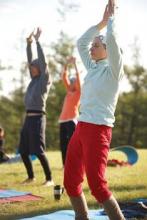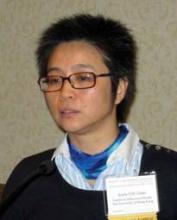NEW ORLEANS – The traditional Chinese medical therapy known as quigong exercise resulted in significant reduction in fatigue scores in patients with chronic fatigue syndrome in a randomized controlled trial.
Qigong also led to significant improvement in validated measures of mental and physical health and spiritual well-being, Jessie S.M. Chan reported at the annual meeting of the Society of Behavioral Medicine.
A dose-response effect was evident. Practicing qigong for at least 30 minutes on at least 3 days per week produced better outcomes, according to Ms. Chan, a doctoral candidate at the University of Hong Kong.
Qigong, translated as "life energy cultivation," is an ancient Taoist art of self-healing. It’s an increasingly popular form of complementary and alternative medicine in the United States. It combines regulation of the body, mind, and breath through a program of gentle exercises and meditation.
From a traditional Chinese medicine perspective, Ms. Chan explained, chronic fatigue syndrome is caused by blood stasis due to a deficiency of Qi, or vital energy. The key treatment strategy entails restoring the balance between yin and yang and stimulation of the blood to get the Qi circulating.
From the perspective of the busy Western primary care physician, of course, chronic fatigue syndrome is an often frustrating condition for which up until now only two interventions have been shown beneficial: cognitive behavioral therapy and graded exercise training.
The randomized trial included 154 patients aged 18-55 years with unexplained chronic fatigue of at least 6 months duration plus multiple other findings consistent with the Centers for Disease Control and Prevention definition of chronic fatigue syndrome. While participants met criteria for the syndrome, most of them did not carry a formal physician diagnosis, and thus would most accurately be said to have chronic fatigue syndrome–like illness, she noted.
Subjects were randomized to two group qigong sessions per week for 5 weeks, with each session lasting 2 hours, along with a recommended 15-30 minutes per day of practice at home, or to a wait-list control group. This was wu xing ping heng gong–style qigong. The movements, consisting of 10 forms, were typically performed in the morning, whereas the meditation was done at night before going to sleep. The focus of the meditation was simply on diaphragmatic breathing.
The primary study end point was change in the 14-item Chalder Fatigue Scale from baseline through 5 weeks of qigong. Subjects in the qigong arm demonstrated a 39% reduction in their total score, while scores in the control arm didn’t change significantly (39.7 vs. 24.4 in the quigong arm compared with 39.8 vs. 34.1 in the control arm). The qigong group also displayed significant improvements in the Short Form-12 physical and mental component scores and the Body-Mind-Spirit Integrative Well-Being score (see chart).
Many patients found the full qigong regimen too arduous or time consuming. Those who practiced qigong at least three times per week and spent an average of 30 minutes or more per session showed nearly twice as great an improvement in Chalder scores as those who did less.
The trial was sponsored by the University of Hong Kong Center on Behavioral Health. Ms. Chan reported having no financial conflicts.



